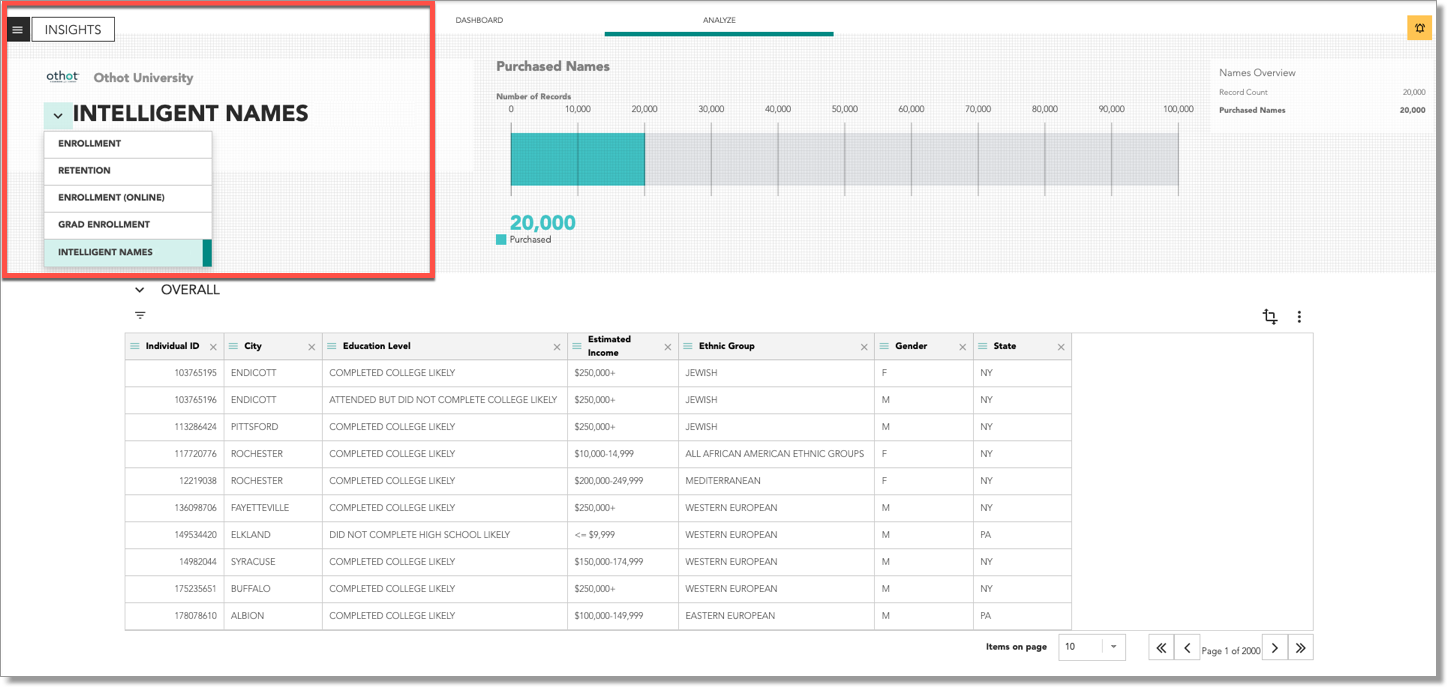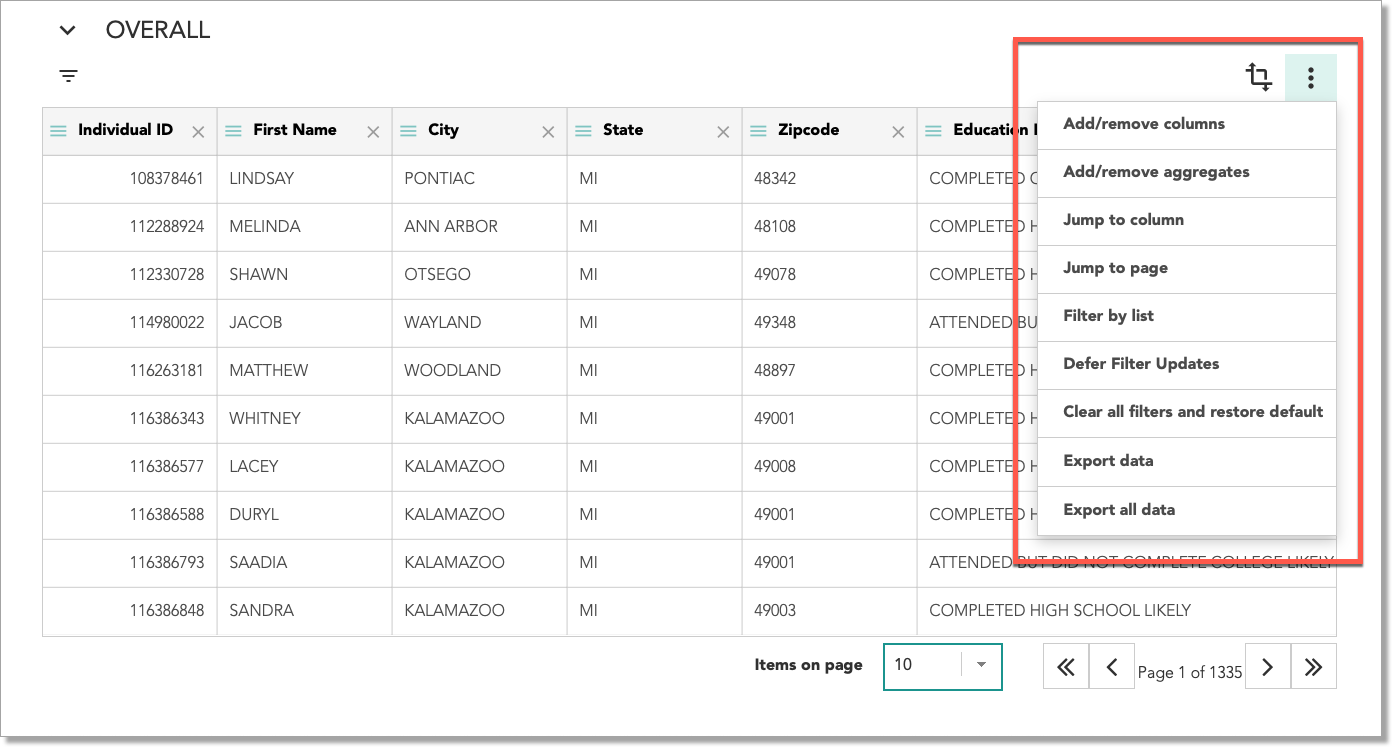Intelligent Names – Overview
Intelligent Names is a product suite designed to help institutions efficiently identify and better understand potential adult learners for recruitment. Our suite consists of several offerings that leverage a comprehensive consumer database of nearly 250 million individuals, covering all fifty US states and containing over 600 data points.
To identify educational intent, we apply advanced data science modeling techniques to national survey results. This allows us to accurately identify and measure the intent of over 100 million adults across the country.
By using this data-driven approach, we help colleges streamline recruitment efforts while focusing on the most promising potential students. With Intelligent Names, colleges can make informed decisions based on reliable data and insights, target marketing activities more efficiently and build high interest recruitment funnels to improve enrollment outcomes.
Accessing Records
Once you've purchased records, you can access them from the products drop-down on the Insights page:

The grid displays all records. Use the ⠇icon to interact with and export the data:

Intent Scores
Intent scores define the intensity to have interest in a particular activity. Within Intelligent Names, we're measuring the intent of an individual to pursue education within the next 12–24 months. Scored from 0 to 100, intent is measured across five categories. Raw scores are then organized by state and assigned a quintile score or 1–5, where 1 captures an individual with the lowest intent and 5 represents an individual with the highest degree of intent.
Approximately 100 million individuals have been assigned intent scores within the following categories:
|
Category |
Description |
|---|---|
|
Vocational Degree |
Individuals with high school degree or less who are interested in vocational education. |
|
Associate’s Degree |
Individuals with high school degree or less who are interested in associate’s degree options. |
|
Bachelor’s Degree |
Individuals with associate's degree or less who are interested in starting or completing a Bachelor’s degree. |
|
Graduate Degree |
Individuals with a degree who are interested in advanced education options. |
|
Online Degree |
Individuals who have a preference for online education options. |
Downloading Data Dictionaries
The following data dictionaries are available for download:
- Intelligent Names Data Dictionary – Explore Subscription
- Intelligent Names Data Dictionary – Enhance Subscription
Once you open a dictionary, you can download it as follows:
- Click ⠇
- Select Export
- Select the export file type (e.g., Export to Microsoft Excel)
Frequently Asked Questions
- Why consider Intelligent Names?
-
Colleges will soon face a significant challenge as the demographic cliff approaches. To cover enrollment shortfalls, institutions will increasingly turn to the adult and graduate education sectors. The challenge here is that comprehensive list sources up to this point have been lacking and traditional sources such as GMAT and GRE have seen market share decrease in recent years.
In this changing market, Intelligent Names products offer a smart solution. Our suite of offerings provides a reliable and informed list of individuals to target recruitment activities towards. By leveraging our offerings, institutions can build a robust funnel for adult and graduate education sectors and be well positioned to overcome the challenges of the demographic cliff.
- How many names are in the database?
-
Our consumer database consists of 242 million commercially active individuals. The data contained within can be used to enhance various client owned lists with household and or individual data. This same dataset has been used to develop our proprietary educational intent scores. Currently there are about 100 million individuals who have been scored on educational intent within the next 12-24 months.
- How often do new names become available?
-
The consumer database updates every quarter (April, July, October, and January) adding new names and updating intent scores. We also refresh our surveys annually and adjust our models accordingly to improve accuracy. At present, the annual survey refresh coincides with the April data release. The outlined cadence ensures subscribers have access to the most current information to drive timely recruitment efforts.
- How are intent scores created?
-
Intent scores are created through a comprehensive process. Firstly, we conduct a national survey with approximately 55,000 respondents from 10 different geographic regions, using representative samples from 550 cohorts. Our survey focuses on gathering demographic and household information, as well as education preferences and enrollment intentions for the next 1-2 years.
We then use advanced statistical modeling to map the survey results to census data and other relevant consumer data sources. This creates a mathematical representation that extends the results across a wider population. By isolating the individuals who are most likely to pursue educational opportunities, we can identify those who have a high intent score.
Finally, we utilize a consumer database of 250 million individuals to further extend the survey results and assign an intent score to over 100 million individuals aged 18-51 within in the United States. This process ensures that our intent scores are accurate and reliable, providing valuable insights for educational institutions and other organizations seeking to understand consumer behavior.
- When receiving records with email address, have these individuals opted into communication?
-
We take great care to ensure the accuracy of the email addresses we provide and to confirm that they are active. However, it's important to note that the individuals on our lists have not explicitly given their consent to receive educational recruitment communications.
To follow best practices, we recommend trying to first obtain an individual’s direct opt-in before sending mass marketing materials. You can craft simple messages explaining the purpose of the communication to request opt-in or you can send something like a short survey. Sending these messages a few times, will help capture the opt in audience necessary for ongoing communications.
The outlined approach ensures that you are sending communications only to individuals who have expressly opted in, reducing the risk of negative feedback, and improving engagement rates. It also demonstrates a commitment to ethical and responsible marketing practices.
- Why is an email address only provided for some of my licensed Intelligent Name's record?
-
We work with several trusted partners to source email information for the purpose of appending to Intelligent Names records. Before releasing data to our customers, each sourced email address must pass several hygiene checks to ensure accuracy. These checks include verifying the accuracy of the email address, confirming its association with the intended individual, and validating that the account is active and capable of receiving messages. Because Intelligent Names measures individual intent, we’ve placed greater priority on sourcing emails believed to be strong matches at the individual level. The added requirement of matching email to an individual vs a household for example limits the universe of emails available to append. These factors result in a lower quantity of emails delivered but a higher quality of the actual email addresses provided.
- Why is the email address incorrect for a contact I received?
-
Even with our stringent quality checks in place, matching emails perfectly to individuals is challenging in today’s environment. While the vast majority of emails matched to individuals will be accurate, customers should be prepared for some mismatches to occur with each licensed list. Together with our data partners we take several steps to minimize these cases from occurring and are committed to further refinement of our processes to continue improvement over time. When an incorrect email is identified, it is recommended to promptly remove it from your system. Additionally, a list of IDs associated with incorrect emails can be shared with the Liaison team for efficient removal from the Intelligent Names master database.
- What are the bounce and opt out rates higher with this list than my other campaigns?
-
Individuals provided through Intelligent Names have not opted into direct communication about education opportunities nor have they agreed to receive information from your college/university in general. This fact contrasts with legacy name buying sources where marketing opt was often included as part of the data collection process. To navigate this reality, when utilizing Intelligent Names records for email campaigns we recommend first obtaining opt in permission. It’s further suggested that opt in campaigns be broken into smaller batches and performance metrics tracked closely. Additionally, the shelf life of an email is relatively short and the validity and verification of emails is ensured at the time of delivery. As a best practice, we strongly recommend initiating communication with the acquired emails promptly to ensure continued accuracy and maximize the likelihood of reaching your intended recipients successfully.
